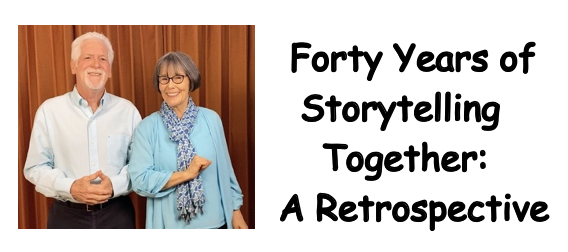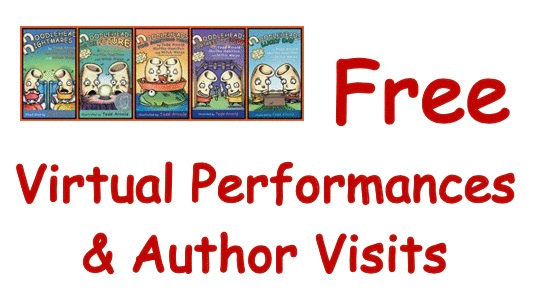Just For Parents

- The Value of Having a Strong Storytelling Tradition in Your Family
- The Importance of Reading Aloud
- How to Enrich Your Family Storytelling Tradition
- Recommended Storytelling Books for Parents
The Value of Having a Strong Storytelling Tradition in Your Family
Stories are an integral part of family life. They have always been used to pass on family history, for entertainment, to teach lessons, to initiate new members into the family and, of course, to put children to sleep. Whether the stories told are family anecdotes about things that really happened, made-up stories, or folktales from various countries, they become part of the "glue" that holds a family together.
Don't underestimate the value of the oldest form of education - oral storytelling. A different kind of magic happens when you put the book aside, look right into your child's eyes, and use hand gestures, facial expression, and voice inflection to tell a story. Since the advent of language people have told stories. "Once upon a time" was heard long before the first book was ever written. Perhaps that is why the orally told story still has the primeval power to bring a hush and a stillness over even a large audience of wiggly preschoolers or hormone-driven teenagers. Oral storytelling is a valuable way of building literacy skills and creating a lifelong love of language. Parents who take the time to tell their children stories one on one, or as a whole family activity, will also find that storytelling works wonders for creating strong family connections and offers a powerful antidote to our technologically-oriented culture. Parents who model storytelling can then encourage their children to tell and make up stories. After all, there aren't many skills that will be more important for success than the ability to tell a coherent and engaging story.
back to topThe Importance of Reading Aloud
That said, by all means, read aloud to your children! Reading aloud is crucial for helping them do well in school - and in life. Children learn to talk long before they learn to read. Receptive vocabulary -- words a child can understand -- far exceeds the child's expressive vocabulary -- words he or she can speak. Jim Trelease, author of The Read Aloud Handbook (which we highly recommend as indispensable for all parents; How to Get Your Child to Love Reading by Esme Codell is also excellent), urges parents to continue to find the time to read to their children long after children have learned to read themselves - always sharing books and stories that are beyond the child's reading comprehension but within their listening comprehension. When we saw Trelease give a speech, he showed photos of himself reading to his teenaged son (now a grown man who is enthusiastic about reading to his own children) while his son did the dishes.
back to top
How to Enrich Your Family Storytelling Tradition
* Every now and then, try putting the book away and telling, not reading, your children a story. You will find a whole new intimacy develops, and the kind of enchantment that occurs around a campfire. Try to make storytelling - by you and your children - a natural part of the family routine. Stories can be told at the dinner table or bedtime, during long car/bus/train/plane rides, and especially at holiday times when all the family is gathered. The intimacy that develops as a result will give your children a strong grounding for their own lives.
Try to remember the stories you heard and loved as a child. Make up stories in which your kids are the main characters. Once you get a story started you will find that your child will supply you with ideas whenever you get stumped. From an early age children should be encouraged to retell stories you've told them, and to make up their own.
* A rich source of stories is from your own life and from your family. By telling your children about events in your childhood, you will help them discover and value their heritage and build links with their past. For example, tell them about:
your first day of school
how your family got its name
a practical joke you played or one that was played on you
when you got lost
when you lost something
how you got a scar
when you or someone you know got a bad haircut
a bad storm or weather disaster you experienced
when you (or someone else) cooked something that didn't come out as planned
when you broke something that belonged to someone else
a time when you laughed so hard you almost cried
a time when you were scared
your pet peeves-the things that make you most upset
a person you will never forget or a person you would like to be like
your best friend
a time you were brave or witnessed an act of bravery
a pet you no longer have
A favorite book that will help you remember family/personal stories that you hadn't thought of in years is A Celebration of American Family Folklore: Tales and Traditions from the Smithsonian Collection by Steven J. Zeitlin et al. Cambridge, MA: Yellow Moon Press, 1982.
* Read and tell world folktales, especially those that come from your own cultural heritage, to your children. However, be sure to share stories from other cultures as well because these stories have a way of demonstrating that, in spite of our differences, human beings around the world have many of the same hopes, dreams, and fears. Wander through the folktale section of your public library or check out our Books and Recordings. Below are photos of Mitch acting out "Little Red Riding Hood" with niece, Kate, when she was young (and so was he, for that matter!) First she meets the Big Bad Wolf and later, the Wolf dressed as Granny. Without much encouragement, Kate developed an early love of telling stories, as you can see from the photo of her telling "The Dark Wood" to her big cousin, Greg.
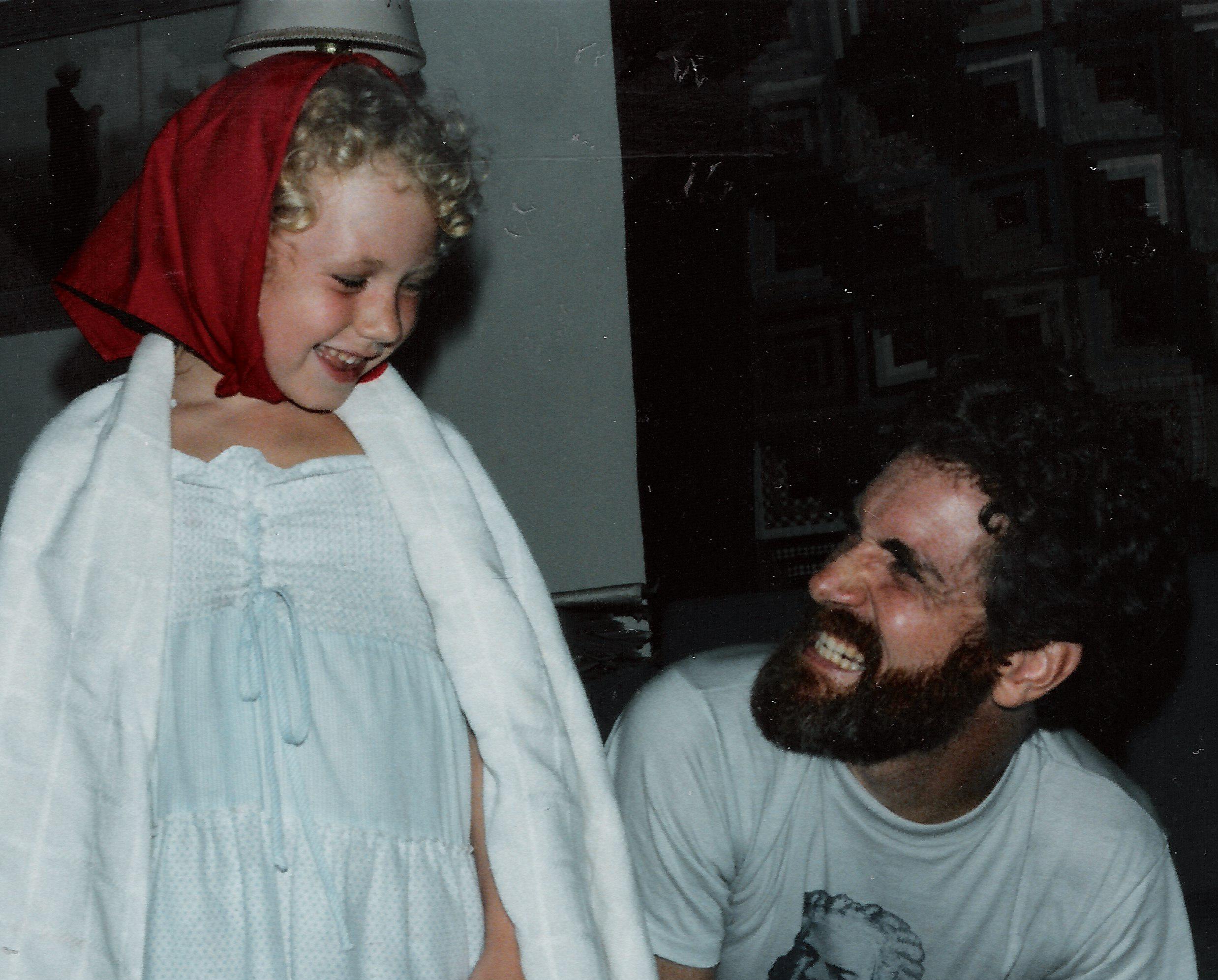
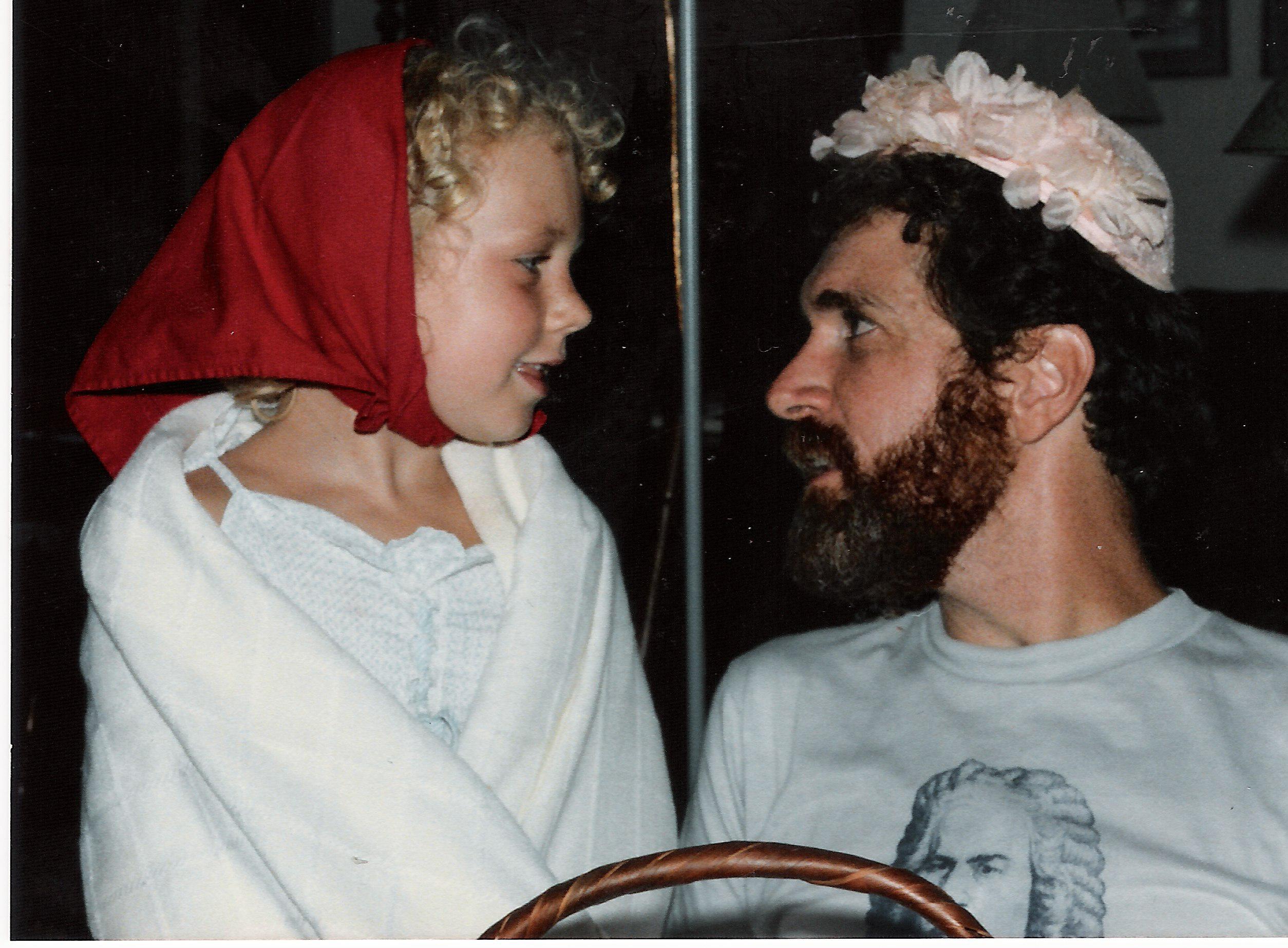
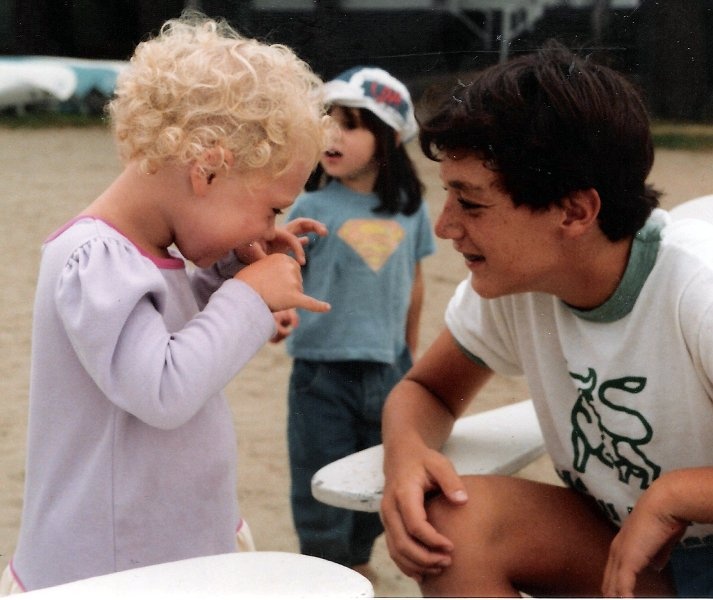
* Make up stories based on folktale models that follow a pattern. For example, after reading How and Why Stories: World Tales Kids Can Read and Tell, you and your children can make up your own tales to explain natural phenomena. This will often stimulate an interest in finding out the real scientific reason for such phenomena. And Noodlehead Stories: World Tales Kids Can Read and Tell will inspire tales about fools. These stories may seem to be completely silly (probably the reason children love them) but surprisingly they can help teach all sorts of lessons about faulty thinking and how not to act. Download our teacher lesson plans Writing How & Why Stories and Writing Noodlehead Stories. They will inspire you and give you ideas for making up stories with your children even if you never write them down at all.
* Play some of the Storytelling Games described on this Web site. Most are appropriate for older children and are a way of continuing your family storytelling tradition as your children grow.
* Literature can provide a jumping-off point for telling stories. For example, read the picture book That's What I Thought by Alice Shertle to younger children. The story tells of how a young girl named Imogene continually asks questions such as "What if it never stopped raining?" and how her family makes up silly stories in response. You and your children can then came up with your own "What if?" stories. Or read Mem Fox's Wilfrid Gordon McDonald Partridge, the story of a small boy who shares his own memories and thus helps a forgetful elderly friend to remember hers. Afterwards, take out your "Box of Memories" into which you have placed photographs and/or small meaningful objects; have your child choose an object and you then tell the story behind it. Eventually, children can create their own memory boxes.
Back to TopRecommended Storytelling Books for Parents
The following books are favorites that were written specifically for parents:
Collins, Chase. 1994. Tell Me a Story: Creating Bedtime Tales Your Children Will Dream On. New York: Houghton Mifflin.
Lipkin, Lisa. 2000. Bringing the Story Home: The Complete Guide to Storytelling for Parents. New York: Norton.
MacDonald, Margaret Read. 2001. The Parent's Guide to Storytelling. Little Rock, AR: August House.
Pellowski, Anne. 1987. The Family Storytelling Handbook: How to Use Stories, Anecdotes, Rhymes, Handkerchiefs, Paper, and Other Objects to Enrich Your Family Traditions. New York: Macmillan.
If you are interested in the nitty-gritty details of how to tell a story well, why and how to encourage your children to tell, and why storytelling is such an effective teaching tool for any subject, Children Tell Stories; Teaching and Using Storytelling in the Classroom will be of interest. Although it was written primarily for classroom use, many have noted that it has a great deal of information that is useful for parents.
